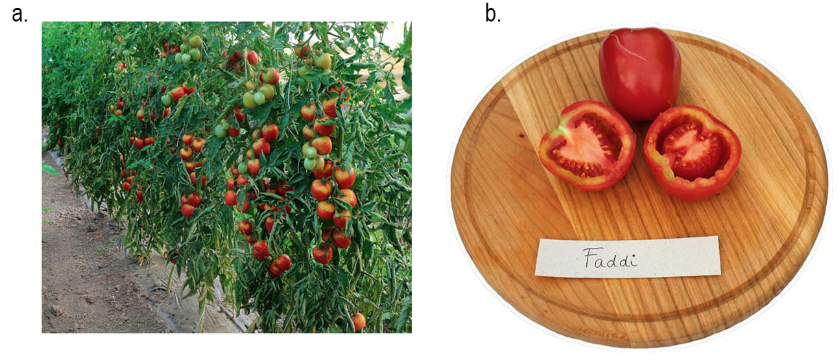Crop: Solanum lycopersicum L. (Tomato)
The landrace called ‘Fadd’ originates from Fadd (Hungary) and it was collected by the Centre for Plant Diversity in 1981.
Fadd is an indeterminate, vigorous and productive landrace, with light pinkish-purplish egg-shaped berries (approx. 50-70 g) and with 5-7 berries/cluster. It flowers in June and it ripens from end July, with a peak in early September. The tip bud of the cluster develops further after pollination. It was graded each year as a very good tasting landrace by farmers, best consumed fresh, in salads. Green work is easy in case of Fadd landrace, as it develops a strong main stem, up to 2 meters, with very few side branches. The berries have very thin skin, which can crack easily with unbalanced or excessive precipitation, too much rain has also negative effect on the taste. Green shoulders and unbalanced ripening are also among the less favourable characteristics of this cultivar. (Cseperkálóné et al. 2017).
Cultivation System: suitable for low-input conditions, organic cultivation.
Geographical Information
Country: Hungary
Fadd was traditionally cultivated in home gardens of the village Fadd (South-west of Hungary). The landrace is abandoned in the region of origin. The National Gene Bank (Centre for Plant Diversity www.nodik.hu) preserved this landrace, which was collected by them in 1981. The Hungarian Research Institute of Organic Agriculture (ÖMKi) requested accessions from the Centre for Plant Diversity in order to carry out on-farm participatory experiments between 2012-2016, comparing tomato landraces (including Fadd) in five growing seasons in Hungary. In 2018 citizens could ‘adopt’ a seedling choosing from 6 varieties (including Fadd). Nowadays it is cultivated by several farmers and hobby gardeners all over the country.
Farmer(s) description:
Farmers and hobby gardeners are growing nowadays the landrace in backyard gardens, organic farms, out of its region of origin, scattered over the county.
Propagation system: Seed, self-pollination
Multiplication procedures and consequences on landrace diversity:Tomato is a predominantly self-pollinating plant, but crosses do occur where presence of insects is high. Each farmer multiplies his own seed under slightly different agronomic conditions. The average number of plants multiplied by each farmer each year ranges from a few to several hundreds. At harvesting, each farmer selects seeds that will be used for the following season.
Management plan existence:No support is provided by local authorities.
Added Values
If there is any market for this landrace, at the moment is very small; it’s mainly grown for own consumption, by hobby gardeners. The landrace is best used for fresh consumption, the storability and processing experiments were giving poor results, therefore there are evidences that this landraceis mainly suitable for home production and for local farmers ‘markets.
Others (e.g. commercial/geographical brands or special traits):‘Fadd’ is registered as conservation variety in the European Common Catalogue of Conservation Varieties following the Commission Directive 2008/62/CE of 20 June 2008.
The Hungarian Research Institute of Organic Agriculture (ÖMKi) launched a participatory research on the usability of Hungarian tomato landraces on organic farms in 2012. The aim of the analysis was to reintroduce landraces that were the most suitable for organic production into Hungarian gardens so that their special and diverse colour, shapes and flavours could be rediscovered. In order to make seeds and seedlings available for the wider public, after a precise description ÖMKi registered the most popular and successful 6 landraces in 2019 and support the seedling production in the frame of the campaign ‘From research to plate’.
Accessions of ‘Fadd’ are kept, under long terms storage conditions in the germplasm bank of the Centre for Plant Diversity, Hungary.
The landrace is maintained since 2012 on-farm beyond and as part of the ÖMKi landrace tomato project.
Centre for Plant Diversity www.nodik.hu
Seeds available via Magház community seed bank.
Case study prepared by The Hungarian Research Institute of Organic Agriculture (ÖMKi), Hungary.
- Cseperkálóné Mirek B., Dr. Drexler D., Papp O. (2017) Paradicsom tájfajták vizsgálata ökológiai gazdálkodásban.
